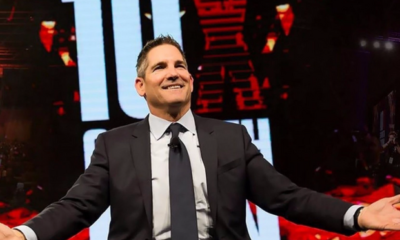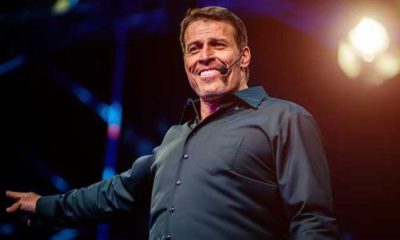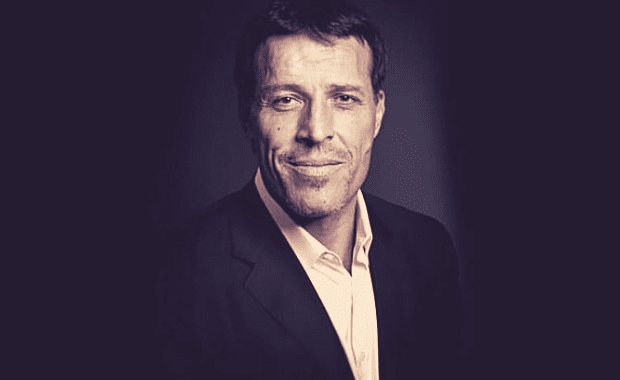Entrepreneurs
How to Build an Unstoppable Mindset According to These 5 Popular Entrepreneurs
If you ask any of the top entrepreneurs, or any entrepreneur for that matter, they’ll tell you that the one quality you need to become successful is mental toughness. Becoming mentally tough is probably something you’ve already heard about before in your life. It’s something that seems easy, yet most people take it granted. They’d rather think about it than become it.
There’s a difference between thinking that you’re mentally tough and living mentally tough day in and day out. Mental toughness will only get harder as you advance as an entrepreneur. There’s never an escape and either you’ll become a shield or it’ll knock you down and you won’t ever be able to recover.
When you think about the tough challenges in front of you today, they’ll seem super easy to overcome a year from now. But that only happens if you become mentally tough. You know you need to become mentally tough by now, yet it’s not enough to know without application of the process.
How exactly do you become mentally tough in your life? These 5 entrepreneurs and performance coaches share exactly what it takes to become mentally tough in your life:
1. Tony Robbins
According to Tony Robbins, becoming mentally stronger is like lifting weights. Over time, you will become stronger. No one starts off in the gym with an amazing physique because it happens over time.
However, becoming mentally stronger is more than just becoming stronger. It’s linking your pain and pleasure together. If you feel more pain than pleasure, you won’t perform an action. But if you derive pleasure from a certain action, then you’ll take action. The more action you take, the more mentally tough you’ll become.
Most people try to avoid pain. They’d rather live an average life than take risks which could bring them more pleasure. When you try to avoid pain, you’re not becoming mentally tough.
You need to stop and think about what’s stopping you from taking action? It’s almost always because you believe when you take that action you’ll receive more pain than pleasure. Your goal should be to take action even if there’s pain associated with that action, because that is how you become mentally stronger.
How do you think about procrastination? You’re giving up your mental freedom. You’re giving into pleasure because you only procrastinate when you want to avoid pain.
2. Grant Cardone
According to Grant Cardone, becoming mentally tough starts with having courage. Each and everyone one of us has the courage to live the best life possible but the majority of us don’t want to take advantage of it. Much like Robbins, we’d rather play it safe than absorb more pain in our life.
You already have courage. Because courage comes from the heart. It’s an innate instinct. If something was happening to your loved one, you’d get the courage real quick to rectify that situation. It’s there, you just have to harness the power on your own.
When you become mentally tough, you’re giving yourself the ability to risk it all. What happens if it doesn’t work out? Then you learn from it! It’s that simple, you don’t have to over-complicate it.
Do something today in spite of the fear you feel. Ask out that girl you’ve been thinking about or make the tough call you’ve been putting off. It’s these seemingly small actions you take each day that will allow you to become more mentally tough in your life.
As you continue to take more risks, you will be proud to be alive. You weren’t put here to live an average life. You were put here to take massive risks and live life to the fullest.
“Approach every situation with a whatever-it-takes-mindset.” – Grant Cardone
3. Eric Thomas
According to Eric Thomas, becoming mentally tough starts with not getting comfortable. Once you become comfortable in your life, you’re no longer going to go after your dreams. You’ll feel content with where you are and won’t want to push further. Your goal should be to improve each day, even if it’s only a small amount.
You must believe wholeheartedly in your dreams. Thomas said that he never talks to anyone before 1pm who aren’t 120% all in on their dreams. This allows you to get unnecessary negativity out of your life. There are millions of people who want to become successful but aren’t, why? Because they didn’t give everything to achieve their dreams.
To become more mentally tough in your life, it starts with changing your routine. If you can get up each morning at the same time, including weekends, you will become mentally tougher, it’s a given. I recommend checking out the book, Miracle Morning. This book is a great start to creating a morning routine for yourself.
The last thing Thomas said is where you put your focus, energy flows. If you think you can’t do something, then you’ll never be able to. But if you put your focus on achieving a desired outcome and will stop at nothing to achieve that outcome, then you’ll eventually achieve it.
4. Ben Newman
According to Ben Newman, becoming mentally tough starts with changing how you think. Ben has worked with numerous athletes and can attest on first hand that they can’t rely solely on their talents. Having talent can only take you so far.
To change the way you think starts with re-framing your mindset. If you’re up against a competitor whether in business or in sports, are you going to give up even if they’ve always been better than you? You shouldn’t because that’s what losers do.
Being from New England, it breaks my heart, but do you think the 2007 New York Giants thought that they couldn’t beat the Patriots even though they already lost previously in the season? They didn’t; they were mentally ready and didn’t count themselves out, no matter the opponent.
Start to focus on solutions instead of problems. People complain all the time but aren’t willing to find a solution. Why? Because it’s easier to complain than find a solution. If you want to become mentally tough, you can’t be like most people. You need to become a rare breed. You must be someone who no matter how much adversity they face will continue to take on the fight.
“The best way to reclaim your dignity is to act rationally and treat yourself lovingly. Do not self-destruct.” – Ben Newman
5. Patrick Bet-David
According to Patrick Bet-David, becoming mentally tough starts with taming the voices inside your head. All of us, it doesn’t matter who you are, each have good and bad voices inside of us. To become mentally tough, you need to block out the bad voice. When you can sense it arising inside of you, you need to push through. That’s the only way you will defeat that negative voice.
Bet-David would say that each of us needs a purpose. When you don’t have a purpose, there’s no chance of you becoming mentally tough. You’ll give into every day temptations and call it quits when you could’ve kept pushing. Developing mental toughness means you push yourself further than even what you thought was possible.
The last piece of advice Bet-David had was to think about how you’ll feel if you don’t go after your dreams? Will you be happy twenty years from now knowing you didn’t follow your dreams? It’ll be quite the contrary. You have the option and choices each day to determine how your life will be and mental toughness will help guide you.
Mental toughness is the essential quality in those who are successful and unsuccessful. Due to this, tell us how you develop this unstoppable mindset? Let us know in the comments below!
Business
Entrepreneur’s Guide to Pay Stubs: Why Freelancers and Small Business Owners Need a Smart Generator
If you’re self-employed and scrambling for income records at the last minute, a smart pay stub generator quietly solves the problem.

For freelancers and small business owners, managing income documentation is often an afterthought until it becomes urgently necessary. (more…)
Change Your Mindset
The Silent Skill That Makes People Respect You Instantly
What truly earns respect and why most people go about it the wrong way

Everybody craves respect but not everyone earns it. Some people believe that a title, years of experience, or a position of authority automatically entitles them to respect. (more…)
Entrepreneurs
The Essential Skills Every Entrepreneur Needs In 2026
Success in the digital age isn’t about luck. It’s about mastering the skills that separate dreamers from doers.

When I was 22 years old, I started my first side hustle as a ghostwriter. (more…)
Business
The Hidden Money Pit in Your Operations (and How to Use It)
See how smart asset management software is quietly saving businesses thousands in wasted time, stock, and maintenance.

Trimming unnecessary expenses and minimizing resources is a general practice in running a business effectively. Asset management software can help you achieve those goals. (more…)
-

 Health & Fitness2 weeks ago
Health & Fitness2 weeks agoWhat Minimalism Actually Means for Your Wellness Choices
-

 News1 week ago
News1 week agoBrandon Willington Builds 7-Figure Business by Ignoring Almost Everything
-

 Did You Know2 weeks ago
Did You Know2 weeks agoWhy Most Online Courses Fail and How to Fix Them
-

 Business2 weeks ago
Business2 weeks agoIf Your Business Internet Keeps Letting You Down, Read This
-

 Business1 day ago
Business1 day agoEntrepreneur’s Guide to Pay Stubs: Why Freelancers and Small Business Owners Need a Smart Generator
























5 Comments